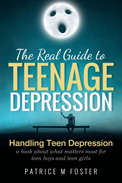
 |
The Real Guide to Teenage Depression: Handling Teen Depression, A book about what matters most for teen boys and teen girls
by Patrice M. Foster
patricemfoster.com
Recognizing the signs of depression can be difficult, but recognizing them in a teenager can be more complex. Foster begins her newest book introducing what depression is and outlines distinct types of depression one may encounter. Segueing from this, she narrows her focus onto teenage depression and the myriad issues that arise during these formidable years. Foster carefully considers more vulnerable teenage populations, such as disabled, LGBTQIA, and minority teens. She also highlights challenges and dangers teens face that lead to and amplify depression while directing our attention to hot topics like bullying, childhood traumas, and suicide. Throughout, she provides ample facts and statistics to support her work. And she finalizes beyond the scope of the book with methods of treatments and other resources for depressed teens.
It is clear that Foster understands the dynamics of teen depression. Thoroughly written in a matter-of-fact style and with clear language, she does not shy away from sensitive topics. While Foster’s book is a simplified one, she in no way conveys the significance of depression and the devastating effects on the teenage demographic any less than her counterparts. She sets out to dispel the stigma of teens “just having a bad day” or facing normal teen pressure, thereby encouraging readers to help themselves and others recognize the serious signs of depression early on. Her research is plainly supported by facts on the scientific and social causes and effects of teen depression, demonstrating her expertise on this often misunderstood subject. One particularly nice touch is how Foster summarizes each chapter to highlight its crucial points for a quick, informal reading. She also reminds readers to seek medical advice when facing more consequential situations. This well-written reference book opens a serious and much-needed dialogue for both teens and parents.
RECOMMENDED by the US Review